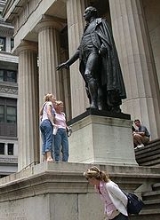
George Washington's legacy
Encyclopedia
George Washington
(February 22, 1732 – December 14, 1799) commanded America's war for independence
(1775–1783), and was the first President of the United States
, from 1789 to 1797. Because of his central role in the founding of the United States
, Washington is often called the "Father of his Country." His devotion to republicanism
and civic virtue
made him an exemplary figure among early American politicians.
general Robert E. Lee
, famously eulogized Washington as:
Lee's words set the standard by which Washington's overwhelming reputation was impressed upon the American memory. Washington set many precedents for the national government and the presidency in particular. In 1951 the unwritten two-term limit set by Washington would become the 22nd Amendment to the Constitution. He also set constitutional precedent by being the first president to use the Presidential Veto.
As early as 1778 he was lauded as the "Father of His Country" and is often considered to be the most important of Founding Fathers of the United States
. He has gained fame around the world as a quintessential example of a benevolent national founder. As Gordon Wood concludes, the greatest act in his life was his resignation as commander of the armies—an act that stunned aristocratic Europe.
Washington was long considered not just a military and revolutionary hero, but a man of great personal integrity, with a deeply held sense of duty, honor and patriotism. He was upheld as a shining example in schoolbooks and lessons: as courageous and farsighted, holding the Continental Army together through eight hard years of war and numerous privations, sometimes by sheer force of will; and as restrained: at war's end taking affront at the notion he should be King; and after two terms as President, stepping aside.
In 1790, Washington's close friend Benjamin Franklin
died. In Franklin's will, he bequeathed Washington his walking cane, which Franklin received while serving as ambassador to France during the 1780s. Franklin spoke highly of Washington, even as a king, in his will:
Washington was always the exemplar of republican
virtue in America. He is seen more as a character model than war hero or founding father. One of Washington's greatest achievements, in terms of republican values, was refraining from taking more power than was due. He was conscientious of maintaining a good reputation by avoiding political intrigue. He had no interest in nepotism or cronyism, rejecting, for example, a military promotion during the war for his deserving cousin William Washington
lest it be regarded as favoritism. Thomas Jefferson
wrote, "The moderation and virtue of a single character probably prevented this Revolution from being closed, as most others have been, by a subversion of that liberty it was intended to establish."
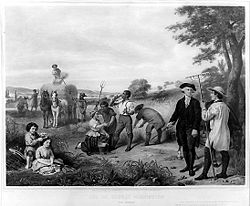 The survival of the United States
The survival of the United States
in large part depended on the actions of George Washington
, the dynamic leader in the American Revolution
and the country's first President
. Washington believed that the institution of slavery on its own would eventually die out and be replaced by an industrial revolution that was beginning to emerge in the Northern states. Washington hoped that the factories built in the North would eventually take root and be built in the South. The demise of slavery, however, was never Washington's primary goal as leader of the nation. Washington believed that the security of the new nation was paramount and for this reason he never publicly spoke out against the imbedded American institution.
Prior to the American Revolution, Washington never displayed any animosity towards slavery. His views on slavery were modified during the Revolution, between 1775 and 1784, having been influenced by the egalitarian belief that men were born with natural rights
. Washington also discovered during the Revolution that free blacks who served in the Revolutionary Army could match the industry, dedication
, and courage
exhibited by white soldiers. After the Revolution, however, Washington was resistant to cut his ties with slavery, an institution that brought him and his family material accouterments, a lavish lifestyle, and inheritance. Although privately expressing "regret" over slavery, Washington was hesitant to cut his personal ties with the institution even at the urging of prominent abolitionists. The only acts of contrition for Washington after the War was his refusal to sell and break up slave families and his discontinued use of whipping as corporal punishment.
In 1794, while President, to resolve his dilemna over slavery, Washington attempted to lease property at Mount Vernon
to English farmers on the condition that former slaves would work as paid free laborers. This idea had been postulated to Washington by a young French abolitionist, Marquis de Lafayette, in a 1784 meeting at Mt. Vernon. However, the plan proved to be improbable and no buyers could be found to purchase the land. Although Washington himself could have freed his own slaves and paid them as workers, he never did. Finally in 1799, Washington made a new secret will without his family's knowledge, that would free all the slaves he owned after his wife, Martha
, died. The younger freedmen were to be taught to read and write and "brought up to some useful occupation", while the elderly were to be taken care of by his remaining family. His slaves were to be allowed to remain in Virginia and not allowed to be compelled to leave, "under any pretense whatsoever." According to historians, his death in 1799 under his new will in essence condemned Mt. Vernon to ruin and was in effect an act of atonement
for Washington's lifetime involvement in human exploitation
. Martha voluntarily freed Washington's slaves in 1800, sixteen months prior to her own death.
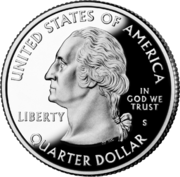 Today, Washington's face and image are often used as national symbols of the United States, along with the icons such as the flag and great seal. Perhaps the most pervasive commemoration of his legacy is the use of his image on the one-dollar bill and the quarter-dollar coin. Washington, together with Theodore Roosevelt
Today, Washington's face and image are often used as national symbols of the United States, along with the icons such as the flag and great seal. Perhaps the most pervasive commemoration of his legacy is the use of his image on the one-dollar bill and the quarter-dollar coin. Washington, together with Theodore Roosevelt
, Thomas Jefferson
, and Abraham Lincoln
, is depicted in stone at the Mount Rushmore Memorial
.
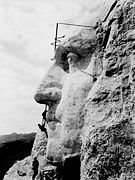 Many things have been named in honor of Washington. George Washington is the namesake of the nation's capital, Washington, D.C.
Many things have been named in honor of Washington. George Washington is the namesake of the nation's capital, Washington, D.C.
, and the state of Washington, the only state to be named for a president. The Washington Monument
, one of the most well-known American landmarks, was built in his honor. The George Washington University
, also in D.C., was named after him, and it was founded in part with shares Washington bequeathed to an endowment to create a national university in Washington. The United States Navy
has named three ships
after Washington. The George Washington Bridge
, which extends between New York City
and New Jersey
, and the palm tree
genus Washingtonia
, are also named after him. There is even a statue of him in London
.
 Though he had been the highest-ranking officer of the Revolutionary War, having in 1798 been appointed a Lieutenant General (now three stars), it seemed, somewhat incongruously, that all later full four star and higher generals were considered to outrank Washington. This issue was resolved in the bicentennial year of 1976 when Washington was, by act of Congress, posthumously promoted to the rank of General of the Armies
Though he had been the highest-ranking officer of the Revolutionary War, having in 1798 been appointed a Lieutenant General (now three stars), it seemed, somewhat incongruously, that all later full four star and higher generals were considered to outrank Washington. This issue was resolved in the bicentennial year of 1976 when Washington was, by act of Congress, posthumously promoted to the rank of General of the Armies
, this promotion being backdated to July 4, 1976., making Washington permanently the senior military officer of the United States.
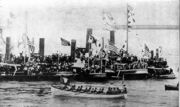
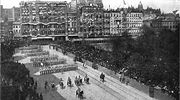 The centennial anniversary of Washington's inauguration as President fell on April 30, 1889. In observance of the occasion President Benjamin Harrison
The centennial anniversary of Washington's inauguration as President fell on April 30, 1889. In observance of the occasion President Benjamin Harrison
followed the itinerary of one hundred years before, from the Governor's mansion in New Jersey to the foot of Wall Street
, in New York City, to old Saint Paul's Church, on Broadway, and to the site where the first Chief Magistrate first took the oath of office. Three days were a round of naval, military, and industrial parades, with music, oratory, pageantry, and festivities. For this Centennial Whittier composed an ode. The venerable S. F. Smith
, who had written "America" fifty-seven years before, was also inspired by the occasion to pen a Century Hymn, and to add to "America" the stanza:
George Washington
George Washington was the dominant military and political leader of the new United States of America from 1775 to 1799. He led the American victory over Great Britain in the American Revolutionary War as commander-in-chief of the Continental Army from 1775 to 1783, and presided over the writing of...
(February 22, 1732 – December 14, 1799) commanded America's war for independence
American Revolutionary War
The American Revolutionary War , the American War of Independence, or simply the Revolutionary War, began as a war between the Kingdom of Great Britain and thirteen British colonies in North America, and ended in a global war between several European great powers.The war was the result of the...
(1775–1783), and was the first President of the United States
President of the United States
The President of the United States of America is the head of state and head of government of the United States. The president leads the executive branch of the federal government and is the commander-in-chief of the United States Armed Forces....
, from 1789 to 1797. Because of his central role in the founding of the United States
United States
The United States of America is a federal constitutional republic comprising fifty states and a federal district...
, Washington is often called the "Father of his Country." His devotion to republicanism
Republicanism in the United States
Republicanism is the political value system that has been a major part of American civic thought since the American Revolution. It stresses liberty and inalienable rights as central values, makes the people as a whole sovereign, supports activist government to promote the common good, rejects...
and civic virtue
Civic virtue
Civic virtue is the cultivation of habits of personal living that are claimed to be important for the success of the community. The identification of the character traits that constitute civic virtue have been a major concern of political philosophy...
made him an exemplary figure among early American politicians.
Public Opinion
Congressman Henry "Light Horse Harry" Lee, a Revolutionary War comrade and father of the American Civil WarAmerican Civil War
The American Civil War was a civil war fought in the United States of America. In response to the election of Abraham Lincoln as President of the United States, 11 southern slave states declared their secession from the United States and formed the Confederate States of America ; the other 25...
general Robert E. Lee
Robert E. Lee
Robert Edward Lee was a career military officer who is best known for having commanded the Confederate Army of Northern Virginia in the American Civil War....
, famously eulogized Washington as:
- First in war, first in peace, and first in the hearts of his countrymen, he was second to none in humble and enduring scenes of private life. Pious, just, humane, temperate, and sincere; uniform, dignified, and commanding; his example was as edifying to all around him as were the effects of that example lasting. . . . Correct throughout, vice shuddered in his presence and virtue always felt his fostering hand. The purity of his private character gave effulgence to his public virtues. . . . Such was the man for whom our nation mourns.
Lee's words set the standard by which Washington's overwhelming reputation was impressed upon the American memory. Washington set many precedents for the national government and the presidency in particular. In 1951 the unwritten two-term limit set by Washington would become the 22nd Amendment to the Constitution. He also set constitutional precedent by being the first president to use the Presidential Veto.
As early as 1778 he was lauded as the "Father of His Country" and is often considered to be the most important of Founding Fathers of the United States
Founding Fathers of the United States
The Founding Fathers of the United States of America were political leaders and statesmen who participated in the American Revolution by signing the United States Declaration of Independence, taking part in the American Revolutionary War, establishing the United States Constitution, or by some...
. He has gained fame around the world as a quintessential example of a benevolent national founder. As Gordon Wood concludes, the greatest act in his life was his resignation as commander of the armies—an act that stunned aristocratic Europe.
Washington was long considered not just a military and revolutionary hero, but a man of great personal integrity, with a deeply held sense of duty, honor and patriotism. He was upheld as a shining example in schoolbooks and lessons: as courageous and farsighted, holding the Continental Army together through eight hard years of war and numerous privations, sometimes by sheer force of will; and as restrained: at war's end taking affront at the notion he should be King; and after two terms as President, stepping aside.
In 1790, Washington's close friend Benjamin Franklin
Benjamin Franklin
Dr. Benjamin Franklin was one of the Founding Fathers of the United States. A noted polymath, Franklin was a leading author, printer, political theorist, politician, postmaster, scientist, musician, inventor, satirist, civic activist, statesman, and diplomat...
died. In Franklin's will, he bequeathed Washington his walking cane, which Franklin received while serving as ambassador to France during the 1780s. Franklin spoke highly of Washington, even as a king, in his will:
- "My fine crab-tree walking stick, with a gold head curiously wrought in the form of the cap of liberty, I give to my friend, and the friend of mankind, General Washington. If it were a Sceptre, he has merited it, and would become it."
Washington was always the exemplar of republican
Republicanism in the United States
Republicanism is the political value system that has been a major part of American civic thought since the American Revolution. It stresses liberty and inalienable rights as central values, makes the people as a whole sovereign, supports activist government to promote the common good, rejects...
virtue in America. He is seen more as a character model than war hero or founding father. One of Washington's greatest achievements, in terms of republican values, was refraining from taking more power than was due. He was conscientious of maintaining a good reputation by avoiding political intrigue. He had no interest in nepotism or cronyism, rejecting, for example, a military promotion during the war for his deserving cousin William Washington
William Washington
William Washington , was an officer of the Continental Army during the American Revolutionary War, who held a final rank of Brigadier General in the newly created United States after the war...
lest it be regarded as favoritism. Thomas Jefferson
Thomas Jefferson
Thomas Jefferson was the principal author of the United States Declaration of Independence and the Statute of Virginia for Religious Freedom , the third President of the United States and founder of the University of Virginia...
wrote, "The moderation and virtue of a single character probably prevented this Revolution from being closed, as most others have been, by a subversion of that liberty it was intended to establish."
Slavery

United States
The United States of America is a federal constitutional republic comprising fifty states and a federal district...
in large part depended on the actions of George Washington
George Washington
George Washington was the dominant military and political leader of the new United States of America from 1775 to 1799. He led the American victory over Great Britain in the American Revolutionary War as commander-in-chief of the Continental Army from 1775 to 1783, and presided over the writing of...
, the dynamic leader in the American Revolution
American Revolution
The American Revolution was the political upheaval during the last half of the 18th century in which thirteen colonies in North America joined together to break free from the British Empire, combining to become the United States of America...
and the country's first President
President of the United States
The President of the United States of America is the head of state and head of government of the United States. The president leads the executive branch of the federal government and is the commander-in-chief of the United States Armed Forces....
. Washington believed that the institution of slavery on its own would eventually die out and be replaced by an industrial revolution that was beginning to emerge in the Northern states. Washington hoped that the factories built in the North would eventually take root and be built in the South. The demise of slavery, however, was never Washington's primary goal as leader of the nation. Washington believed that the security of the new nation was paramount and for this reason he never publicly spoke out against the imbedded American institution.
Prior to the American Revolution, Washington never displayed any animosity towards slavery. His views on slavery were modified during the Revolution, between 1775 and 1784, having been influenced by the egalitarian belief that men were born with natural rights
Natural rights
Natural and legal rights are two types of rights theoretically distinct according to philosophers and political scientists. Natural rights are rights not contingent upon the laws, customs, or beliefs of any particular culture or government, and therefore universal and inalienable...
. Washington also discovered during the Revolution that free blacks who served in the Revolutionary Army could match the industry, dedication
Dedication
Dedication is the act of consecrating an altar, temple, church or other sacred building. It also refers to the inscription of books or other artifacts when these are specifically addressed or presented to a particular person. This practice, which once was used to gain the patronage and support of...
, and courage
Courage
Courage is the ability to confront fear, pain, danger, uncertainty, or intimidation...
exhibited by white soldiers. After the Revolution, however, Washington was resistant to cut his ties with slavery, an institution that brought him and his family material accouterments, a lavish lifestyle, and inheritance. Although privately expressing "regret" over slavery, Washington was hesitant to cut his personal ties with the institution even at the urging of prominent abolitionists. The only acts of contrition for Washington after the War was his refusal to sell and break up slave families and his discontinued use of whipping as corporal punishment.
In 1794, while President, to resolve his dilemna over slavery, Washington attempted to lease property at Mount Vernon
Mount Vernon
The name Mount Vernon is a dedication to the English Vice-Admiral Edward Vernon. It was first applied to Mount Vernon, the Virginia estate of George Washington, the first President of the United States...
to English farmers on the condition that former slaves would work as paid free laborers. This idea had been postulated to Washington by a young French abolitionist, Marquis de Lafayette, in a 1784 meeting at Mt. Vernon. However, the plan proved to be improbable and no buyers could be found to purchase the land. Although Washington himself could have freed his own slaves and paid them as workers, he never did. Finally in 1799, Washington made a new secret will without his family's knowledge, that would free all the slaves he owned after his wife, Martha
Martha Washington
Martha Dandridge Custis Washington was the wife of George Washington, the first president of the United States. Although the title was not coined until after her death, Martha Washington is considered to be the first First Lady of the United States...
, died. The younger freedmen were to be taught to read and write and "brought up to some useful occupation", while the elderly were to be taken care of by his remaining family. His slaves were to be allowed to remain in Virginia and not allowed to be compelled to leave, "under any pretense whatsoever." According to historians, his death in 1799 under his new will in essence condemned Mt. Vernon to ruin and was in effect an act of atonement
Atonement
Atonement is a doctrine that describes how human beings can be reconciled to God. In Christian theology the atonement refers to the forgiving or pardoning of sin through the death of Jesus Christ by crucifixion, which made possible the reconciliation between God and creation...
for Washington's lifetime involvement in human exploitation
Exploitation
This article discusses the term exploitation in the meaning of using something in an unjust or cruel manner.- As unjust benefit :In political economy, economics, and sociology, exploitation involves a persistent social relationship in which certain persons are being mistreated or unfairly used for...
. Martha voluntarily freed Washington's slaves in 1800, sixteen months prior to her own death.
Monuments and memorials

Theodore Roosevelt
Theodore "Teddy" Roosevelt was the 26th President of the United States . He is noted for his exuberant personality, range of interests and achievements, and his leadership of the Progressive Movement, as well as his "cowboy" persona and robust masculinity...
, Thomas Jefferson
Thomas Jefferson
Thomas Jefferson was the principal author of the United States Declaration of Independence and the Statute of Virginia for Religious Freedom , the third President of the United States and founder of the University of Virginia...
, and Abraham Lincoln
Abraham Lincoln
Abraham Lincoln was the 16th President of the United States, serving from March 1861 until his assassination in April 1865. He successfully led his country through a great constitutional, military and moral crisis – the American Civil War – preserving the Union, while ending slavery, and...
, is depicted in stone at the Mount Rushmore Memorial
Mount Rushmore
Mount Rushmore National Memorial is a sculpture carved into the granite face of Mount Rushmore near Keystone, South Dakota, in the United States...
.

Washington, D.C.
Washington, D.C., formally the District of Columbia and commonly referred to as Washington, "the District", or simply D.C., is the capital of the United States. On July 16, 1790, the United States Congress approved the creation of a permanent national capital as permitted by the U.S. Constitution....
, and the state of Washington, the only state to be named for a president. The Washington Monument
Washington Monument
The Washington Monument is an obelisk near the west end of the National Mall in Washington, D.C., built to commemorate the first U.S. president, General George Washington...
, one of the most well-known American landmarks, was built in his honor. The George Washington University
George Washington University
The George Washington University is a private, coeducational comprehensive university located in Washington, D.C. in the United States...
, also in D.C., was named after him, and it was founded in part with shares Washington bequeathed to an endowment to create a national university in Washington. The United States Navy
United States Navy
The United States Navy is the naval warfare service branch of the United States Armed Forces and one of the seven uniformed services of the United States. The U.S. Navy is the largest in the world; its battle fleet tonnage is greater than that of the next 13 largest navies combined. The U.S...
has named three ships
USS George Washington
Four ships of the United States Navy have been named USS George Washington in honor of George Washington., was purchased on 12 October 1798 and served for less than four years. She was sold in May 1802....
after Washington. The George Washington Bridge
George Washington Bridge
The George Washington Bridge is a suspension bridge spanning the Hudson River, connecting the Washington Heights neighborhood in the borough of Manhattan in New York City to Fort Lee, Bergen County, New Jersey. Interstate 95 and U.S. Route 1/9 cross the river via the bridge. U.S...
, which extends between New York City
New York City
New York is the most populous city in the United States and the center of the New York Metropolitan Area, one of the most populous metropolitan areas in the world. New York exerts a significant impact upon global commerce, finance, media, art, fashion, research, technology, education, and...
and New Jersey
New Jersey
New Jersey is a state in the Northeastern and Middle Atlantic regions of the United States. , its population was 8,791,894. It is bordered on the north and east by the state of New York, on the southeast and south by the Atlantic Ocean, on the west by Pennsylvania and on the southwest by Delaware...
, and the palm tree
Arecaceae
Arecaceae or Palmae , are a family of flowering plants, the only family in the monocot order Arecales. There are roughly 202 currently known genera with around 2600 species, most of which are restricted to tropical, subtropical, and warm temperate climates...
genus Washingtonia
Washingtonia
Washingtonia is a genus of palms, native to the southwestern United States and northwest Mexico...
, are also named after him. There is even a statue of him in London
London
London is the capital city of :England and the :United Kingdom, the largest metropolitan area in the United Kingdom, and the largest urban zone in the European Union by most measures. Located on the River Thames, London has been a major settlement for two millennia, its history going back to its...
.

General of the Armies
General of the Armies of the United States, or more commonly referred to as General of the Armies, is the highest possible officer rank of the United States Army.Only two soldiers have been granted the rank of General of the Armies; John J...
, this promotion being backdated to July 4, 1976., making Washington permanently the senior military officer of the United States.
Centennial celebration


Benjamin Harrison
Benjamin Harrison was the 23rd President of the United States . Harrison, a grandson of President William Henry Harrison, was born in North Bend, Ohio, and moved to Indianapolis, Indiana at age 21, eventually becoming a prominent politician there...
followed the itinerary of one hundred years before, from the Governor's mansion in New Jersey to the foot of Wall Street
Wall Street
Wall Street refers to the financial district of New York City, named after and centered on the eight-block-long street running from Broadway to South Street on the East River in Lower Manhattan. Over time, the term has become a metonym for the financial markets of the United States as a whole, or...
, in New York City, to old Saint Paul's Church, on Broadway, and to the site where the first Chief Magistrate first took the oath of office. Three days were a round of naval, military, and industrial parades, with music, oratory, pageantry, and festivities. For this Centennial Whittier composed an ode. The venerable S. F. Smith
Samuel Francis Smith
Samuel Francis Smith, , Baptist minister, journalist and author, is best known for having written the lyrics to "My Country, 'Tis of Thee", which he entitled America.-Early life:...
, who had written "America" fifty-seven years before, was also inspired by the occasion to pen a Century Hymn, and to add to "America" the stanza:
- Our joyful hearts today,
- Their grateful tribute pay,
- Happy and free,
- After our toils and fears,
- After our blood and tears,
- Strong with our hundred years,
- O God, to Thee.

